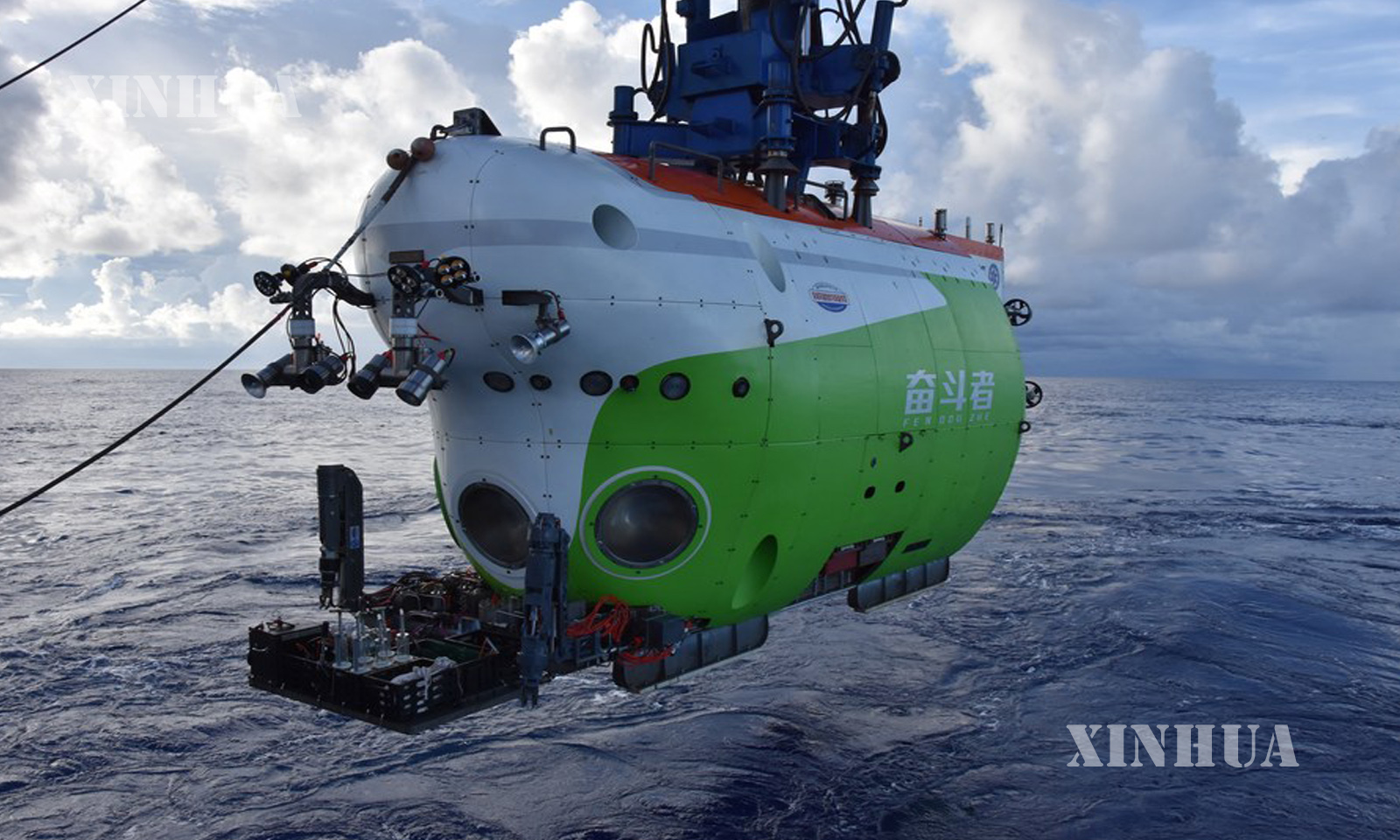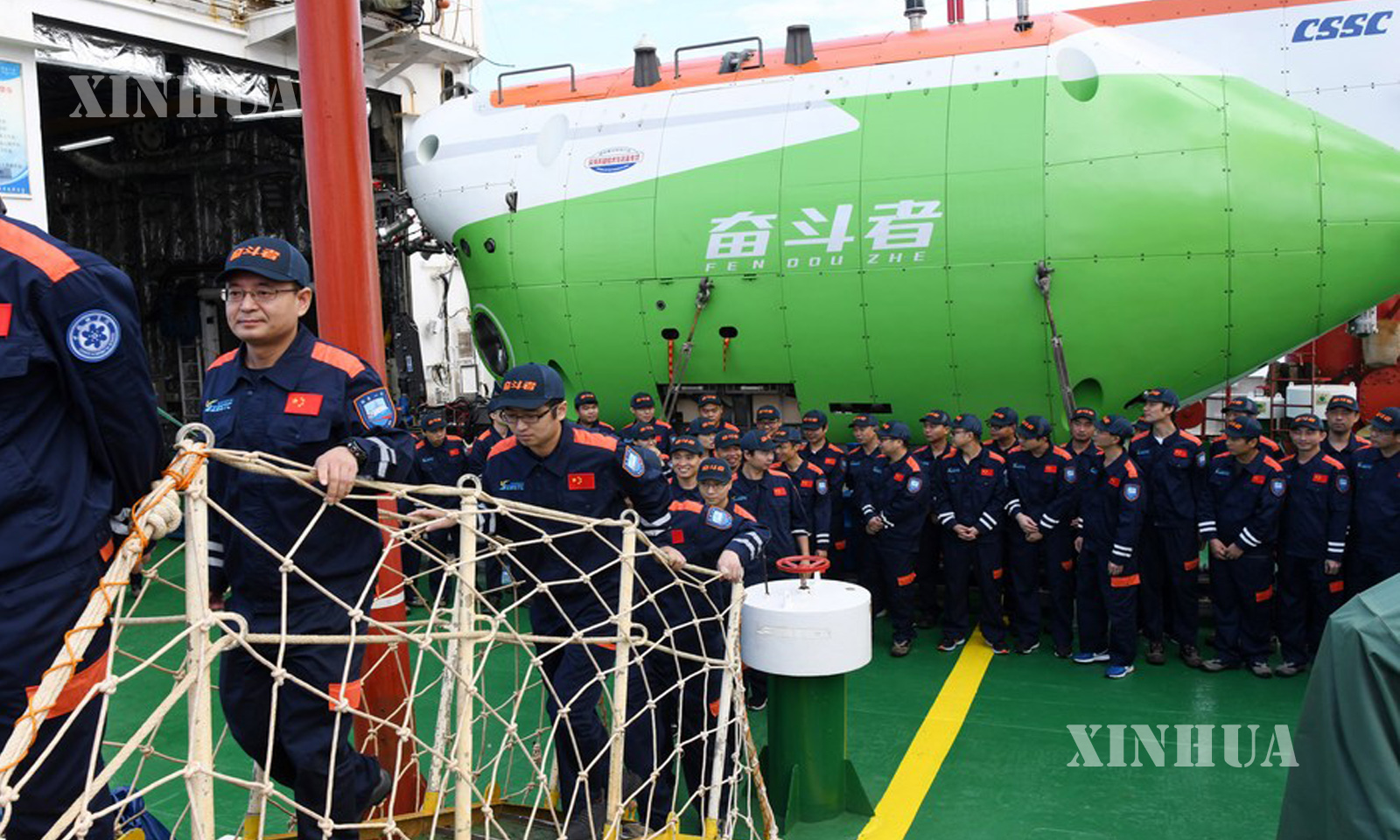China
သမုဒ္ဒရာနက်ပိုင်း စူးစမ်းလေ့လာရေးခရီးစဉ်မှ တရုတ်နိုင်ငံ၏ သုတေသနသင်္ဘော Tansuo-1 ပြန်လည် ရောက်ရှိ

ဆန်းရ ၊ ဒီဇင်ဘာ ၆ ရက်(ဆင်ဟွာ)
တရုတ်နိုင်ငံ၏ သိပ္ပံသုတေသနသင်္ဘော Tansuo-1 သည် အနောက်ပစိဖိတ်သမုဒ္ဒရာရှိ Mariana Trench တွင် သမုဒ္ဒရာနက်ပိုင်း စူးစမ်းလေ့လာရေးအား အလုံးစုံပြီးမြောက်အောင်ဆောင်ရွက်ခဲ့ပြီးနောက် ဒီဇင်ဘာ ၅ ရက်တွင် တရုတ်နိုင်ငံ တောင်ပိုင်း ဟိုင်နန်ပြည်နယ် ဆန်းရမြို့ရှိ ဆိပ်ကမ်းတစ်ခုသို့ ပြန်လည်ရောက်ရှိလာခဲ့ကြောင်း သိရသည်။

၂၀၂၀ပြည့်နှစ် နိုဝင်ဘာ ၂၈ ရက်က တရုတ်နိုင်ငံ တောင်ပိုင်း ဟိုင်နန်ပြည်နယ် ဆန်းရမြို့ နန်းဆန်းဆိပ်ကမ်း မှ မထွက်ခွာမီ တရုတ်နိုင်ငံ၏ သမုဒ္ဒရာနက်ပိုင်းစူးစမ်းလေ့လာရေးသင်္ဘော Tansuo-1 ပေါ်သို့ သင်္ဘောသားများ တက်ရောက်နေသည်ကိုတွေ့ရစဉ်(ဆင်ဟွာ)
ပင်လယ်ရေနက်ကြမ်းပြင်ထိ ငုပ်လျှိုပေးသော ရေငုပ်သင်္ဘောငယ် (Fendouzhe) အား သယ်ဆောင်လာထားသော ယင်းသုတေသနသင်္ဘောသည် တနင်္ဂနွေနေ့ နံနက်ပိုင်းက ပြန်လည်ရောက်ရှိခဲ့ခြင်းဖြစ်ကြောင်း တရုတ်နိုင်ငံသိပ္ပံပညာအကယ်ဒမီ၏ သမုဒ္ဒရာရေနက်ပိုင်းဆိုင်ရာ သိပ္ပံ နှင့် နည်းပညာဌာန၏ ထုတ်ပြန်ချက်အရ သိရသည်။
၂၀၂၁ ခုနှစ်အောက်တိုဘာ ၁၄ ရက်တွင် စတင်ခဲ့သည့် ၅၃ ရက်ကြာ သမုဒ္ဒရာ စူးစမ်းလေ့လာရေးခရီးစဉ်အတွင်း တရုတ်နိုင်ငံထုတ် Fendouzhe ရေငုပ်သင်္ဘောငယ်သည် ၂၃ ကြိမ် တိတိ ရေအောက်သို့ အောင်မြင်စွာ ငုပ်ဆင်းနိုင်ခဲ့ပြီး ယင်းတို့အနက် ၆ ကြိမ်မှာ ရေအောက်အနက် ၁၀,၀၀၀ မီတာအထိ ငုပ်လျှိုးခဲ့ခြင်းဖြစ်ကြောင်း သိရသည်။
သိပ္ပံသုတေသနပညာရှင်များသည် အရွယ်အစားကြီးမားသော သက်ရှိ အမျိုးမျိုး ၊ အရွယ်အစား အလွန်သေးငယ်သော ပင်ရင်းသက်ရှိအကောင်ဗလောင်ငယ်များ ၊ သမုဒ္ဒရေအောက် အနယ်အနှစ်များ နှင့် ကျောက်သားနမူနာများကို စုဆောင်းခဲ့ပြီး ယင်းနေရာရှိ မျိုးရိုးဗီဇသုတေသနပြုမူတွင် အသုံးပြုရန်အတွက် သက်တမ်းတွက်ချက်ရန် နှင့် ပထဝီဝင်အနေအထားကို ပိုမိုနားလည်စေရန် တို့ဖြစ်ကြောင်း တရုတ်နိုင်ငံသိပ္ပံပညာအကယ်ဒမီ၏ သမုဒ္ဒရာရေနက်ပိုင်းဆိုင်ရာ သိပ္ပံ နှင့် နည်းပညာဌာန၏ ထုတ်ပြန်ချက်အရ သိရသည်။
ထိုသို့ပင်လယ်ထဲသွားရောက်စဉ်ကာလအတွင်း တရုတ်နိုင်ငံသုတေသနအဖွဲ့များသည် စူးစမ်းလေ့လာမှုကို ပါဝင်ဆောင်ရွက်ခဲ့ပြီး Mariana သဘာတူညီချက်ကို ပူးတွဲထုတ်ပြန်ခဲ့သည်။ ယင်းသဘောတူညီချက်က ရေရှည်ထိန်းသိမ်းစောင့်ရှောက်မှုကို နားလည်သိရှိစေရန် နှင့် သမုဒ္ဒရာနက်ပိုင်း သိပ္ပံနမူနာများ နှင့် အချက်အလက်များမျှဝေရန် ရေနက်ပိုင်းစူးစမ်းလေ့လာမှု စံနှုန်းအဆင့်တစ်ခုသတ်မှတ်ရေး ထူထောင်ရန်တောင်းဆိုခဲ့ပြီး ယင်းမှာ ပင်လယ်ရေနက်ပိုင်းစူးစမ်းရှာဖွေရေးဆိုင်ရာ နိုင်ငံတကာပူးပေါင်းဆောင်ရွက်မှု အောင်မြင်မှု ရရှိစေရန် အတွက်ဖြစ်ကြောင်း သိရသည်။
ယင်းအဖွဲ့သည် စူးစမ်းလေ့လာရေးခရီးစဉ်အတွင်း Mariana Trench သဘာဝပတ်ဝန်းကျင် နှင့် ဂေဟ စနစ် သုတေသနစီမံကိန်း (MEER) ကိုလည်း ထုတ်ပြန်ခဲ့သည်။ စီမံကိန်း၏ ရည်ရွယ်ချက်မှာ MEER တွင် ပူးပေါင်းပါဝင်ရန် ပြည်တွင်း နှင့် ပြည်ပ မှ သုတေသီများကို ပိုမိုဖိတ်ခေါ်ကာ သက်ရှိတို့၏ မူလအစ နှင့် ပတ်ဝန်းကျင်လိုက်လျောညီထွေရှိမှု ၊ ဇီဝမျိုးစုံမျိုးကွဲ နှင့် ရာသီဥတုပြောင်းလဲခြင်း ၊ အခြားအမျိုးမျိုးသော အကြောင်းအရာများတွင် အဓိကသိပ္ပံဆိုင်ရာ ကိစ္စရပ်များအား အတူတကွ ကိုင်တွယ်ဖြေရှင်းသွားရန် ဖြစ်ကြောင်း သိရသည်။ (Xinhua)
————————————
(English Version)
China’s research ship Tansuo-1 returns from deep-ocean expedition
SANYA, Dec. 6 (Xinhua) — China’s scientific research ship Tansuo-1 returned to a port in the city of Sanya, in south China’s Hainan Province, on Sunday, after completing its deep-ocean expedition to the Mariana Trench.
The vessel, which carries the deep-sea manned submersible Fendouzhe (Striver), berthed on Sunday morning, according to the Institute of Deep-sea Science and Engineering of the Chinese Academy of Sciences.
During the 53-day expedition, which started on Oct. 14, the China-built Fendouzhe successfully completed 23 dives, six of which exceeded a depth of 10,000 meters.
Scientific researchers collected several large organisms, in-situ micro-organisms, sediments and rock samples, accumulating valuable data for use in genetic research on the area and understanding its geological structure, according to the institute.
During the voyage, Chinese research teams participating in the expedition jointly launched the Mariana Consensus. The consensus calls for the establishment of a standardized system for deep-sea expeditions to realize the long-term preservation and sharing of deep-ocean scientific samples and data, so as to achieve international cooperation on deep-sea expeditions.
The team also launched the Mariana Trench Environment and Ecology Research Project (MEER) during the expedition. The project aims to invite more researchers from home and abroad to join in the MEER, so as to tackle major scientific issues together, such as the origins of life and environmental adaptation, biodiversity and climate change, among others.
Photo(1) China-built the deep-sea manned submersible Fendouzhe (Striver).
Photo (2)Crew members of Tansuo-1 disembark from the vessel at the Nanshan port in Sanya, south China’s Hainan Province, Nov. 28, 2020. (Xinhua/Chen Kaizi)






